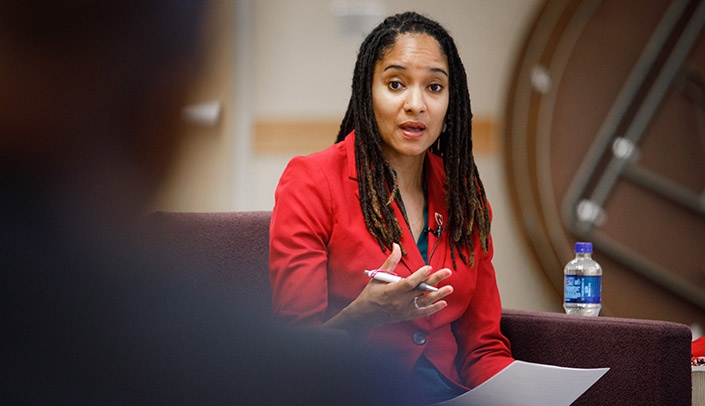“I want to acknowledge how difficult a topic this is to discuss,” said Sheritta Strong, M.D., assistant professor of psychiatry and interim director of inclusion, as she kicked off the first in a series of “listening sessions” at UNMC.
These sessions follow the death of George Floyd in Minneapolis, which initiated protests and national calls to end structural racism, and the death of James Scurlock during such a protest in Omaha.
“We have to acknowledge that it’s OK to be uncomfortable,” Dr. Strong continued. “And we have to be comfortable being uncomfortable with the topics we are going to discuss.”
Dr. Strong led the discussion, held remotely via Zoom, during the ongoing COVID-19 pandemic. She was joined by a panel that included Dele Davies, M.D., senior vice chancellor for academic affairs; Aileen Warren, assistant vice chancellor for human resources; and Tom Schroeder, UNMC Student Senate President and Student Regent. UNMC Chancellor Jeffrey P. Gold, M.D., introduced the session, then stepped back to listen.
Please provide feedback or comments anonymously, and click here to listen to a recording of the listening session.
“These discussions are going to require intense listening and result in outcome driven actions,” Dr. Gold said at the conclusion of the event.
The panelists reacted to a steady stream of questions from the online audience.
Dr. Strong paraphrased colleague Carl Smith, M.D., that while commitment from leadership is crucial, “It takes a reminder from anyone, with gentle, firm conversations,” to truly change culture.
Dr. Davies agreed. Racism, “It’s not somebody’s responsibility. It is everybody’s responsibility . . . We all own it.”
Dr. Strong related this to everyone’s explicit and implicit biases that can perpetuate the problem.
Warren is encouraged that perhaps more individuals are speaking out against it than in previous occasions.
“As someone born in Omaha and has lived here all my life, this feels different,” she said.
Schroeder, the student senate president, said, “What we need to do is recognize racism is something that is a direct threat to our patient population. We need to call it out similarly to the way we do other dangerous practices.”
But that takes individual courage and a supportive culture, Schroeder noted.
And, Dr. Strong said, there is a difference between calling out racism and actually being actively anti-racist.
So, words and gestures of support are helpful. But it is what each of us does, individually and collectively, that will move the needle.
Dr. Davies noted that one of every nine of UNMC’s strategic initiatives is tied to diversity, inclusion and equity. “We are on the right track,” he said, but he compared it to “planting a tree.”
Dr. Strong said, and Dr. Gold agreed, that UNMC should have a physical office for inclusion and multicultural affairs, a physical “safe space.”
So, this is just the beginning.
“We need to keep this up, which is why we are creating this as a series,” Schroeder said.
But what now?
“Take time to check on the mental health of your Black and Brown friends, classmates and co-workers — and listen to their experiences,” Schroeder said.
Keep on: “I feel obligated not to give up,” Warren said, for everyone who came before.
To the student who asked the question related to feeling hopeless: “Stay hopeful,” Dr. Strong said. “Continue to have hope. Continue to be involved in the process, continue to have these discussions. Continue to be bold and willing to have difficult conversations.”
And, “Above all,” Dr. Gold said, “please be safe.”

Thank you for this excellent discussion of a difficult topic which was so needed.
I am grateful that our campus is working toward action items to combat systemic racism and aim for health equity. I look forward to continuing this conversation and begin more conversations surrounding white privilege.
Dr Strong is an awesome and caring person and MD.
thanks DR Strong!